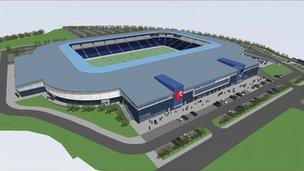Hewlett Packard criticises Bristol Rovers stadium plan
- Published

Bristol Rovers' new stadium would have 20,000 seats
A multi-national firm has said the planned Bristol Rovers stadium on university land is likely to be a "bad neighbour".
Hewlett Packard (HP) has submitted its views to South Gloucestershire Council as part of the planning process.
The club wants to build a 20,000-seat stadium on land owned by the University of the West of England (UWE).
HP said it was having a "positive dialogue" with both parties to address its concerns over the proposals.
'Club's aspirations'
A spokesman for HP said: "HP is not objecting in principle to the new Bristol Rovers stadium.
"We have asked for reassurances around the detail of how Bristol Rovers will act as a neighbour to ensure HP's business operations are not compromised.
"We continue to have a positive dialogue with UWE and Bristol Rovers and are pleased with the progress being made to address our concerns."
The eight-page submission has highlighted a number of areas:
The land in question has already been zoned for employment use by the council
No study has been made to show whether the employment land is required
No evidence to show why the stadium needs to move, as the highest gate was 8,427 in 2011-12 at the Memorial Ground and would be 27.5%-39% of the proposed new 20,000-seater stadium
The stadium could be a "bad neighbour" because it could the devalue neighbouring commercial properties
No noise level studies have been made
No proof over whether the stadium would regenerate the local area
Nick Higgs, chairman of Bristol Rovers FC, said 90% of the issues had now been addressed since the document was submitted to the council at the beginning of April.
"We intend to be a good neighbour. We've gone through all the issues they've raised, some have been planning issues, some have been operational and some have no relevance to the plans [for a larger stadium], as they're part of the club's aspirations."
The operational issues include congestion on match days, lighting and litter, which the club has said it is addressing.
- Published16 April 2012
- Published13 December 2011